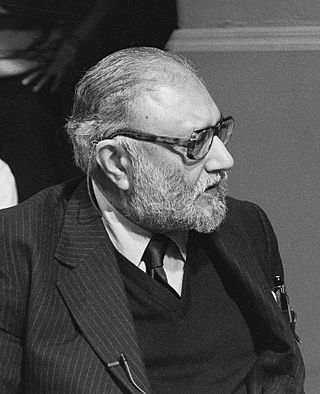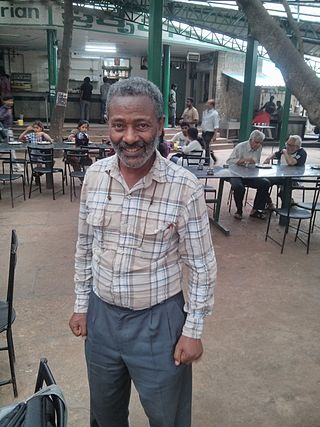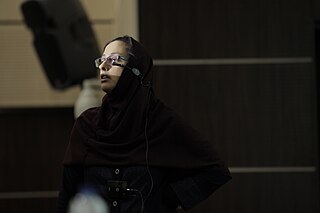Related Research Articles
The Dirac Medal or Dirac prize can refer to different awards named in honour of the physics Nobel Laureate Paul Dirac.

Mohammad Abdus Salam was a Pakistani theoretical physicist. He shared the 1979 Nobel Prize in Physics with Sheldon Glashow and Steven Weinberg for his contribution to the electroweak unification theory. He was the first Pakistani and the first scientist from an Islamic country to receive a Nobel Prize and the second from an Islamic country to receive any Nobel Prize, after Anwar Sadat of Egypt.

Ashoke Sen FRS is an Indian theoretical physicist and distinguished professor at the International Centre for Theoretical Sciences (ICTS), Bangalore. A former distinguished professor at the Harish-Chandra Research Institute, Allahabad, He is also an honorary fellow in National Institute of Science Education and Research (NISER) India he is also a Morningstar Visiting professor at MIT and a distinguished professor at the Korea Institute for Advanced Study. His main area of work is string theory. He was among the first recipients of the Breakthrough Prize in Fundamental Physics "for opening the path to the realization that all string theories are different limits of the same underlying theory".

Fernando Quevedo Rodríguez is a Guatemalan physicist and obtained his early education in Guatemala. He was the director of the Abdus Salam International Centre for Theoretical Physics (ICTP) between October 2009 and November 2019.

The Abdus Salam International Centre for Theoretical Physics (ICTP) is a research center for physical and mathematical sciences, located in Trieste, Friuli-Venezia Giulia, Italy.

Giorgio Parisi is an Italian theoretical physicist, whose research has focused on quantum field theory, statistical mechanics and complex systems. His best known contributions are the QCD evolution equations for parton densities, obtained with Guido Altarelli, known as the Altarelli–Parisi or DGLAP equations, the exact solution of the Sherrington–Kirkpatrick model of spin glasses, the Kardar–Parisi–Zhang equation describing dynamic scaling of growing interfaces, and the study of whirling flocks of birds. He was awarded the 2021 Nobel Prize in Physics jointly with Klaus Hasselmann and Syukuro Manabe for groundbreaking contributions to theory of complex systems, in particular "for the discovery of the interplay of disorder and fluctuations in physical systems from atomic to planetary scales".
Alexei Yuryevich Smirnov is a neutrino physics researcher and one of the discoverers of the MSW Effect.
The DST-ICTP-IMU Ramanujan Prize for Young Mathematicians from Developing Countries is a mathematics prize awarded annually by the International Centre for Theoretical Physics in Italy. The prize is named after the Indian mathematician Srinivasa Ramanujan. It was founded in 2004, and was first awarded in 2005.

Seifallah Randjbar-Daemi is an Iranian theoretical physicist. He is currently an Emeritus Scientist at the International Centre for Theoretical Physics.
Abdullah Al Mamun is a Bangladeshi physicist who is a professor of physics at Jahangirnagar University, Dhaka, Bangladesh.

Mulugeta Bekele is an Ethiopian scientist and academic. He is an associate Professor of Physics at Addis Ababa University (AAU), Ethiopia. He completed his PhD in Physics at the Indian Institute of Science, Bangalore, India in 1997. He has been awarded the Andrei Sakharov Prize by the American Physical Society (APS) "For tireless efforts in defense of human rights and freedom of expression and education anywhere in the world, and for inspiring students, colleagues and others to do the same." He is the president of Ethiopian Physical Society since October 1998 and an Associate Member of the Abdus Salam International Centre for Theoretical Physics, Trieste, Italy since May 1999.

Yasaman Farzan is an Iranian researcher. She is a faculty member of Institute for Research in Fundamental Sciences.
Abhishek Dhar is an Indian physicist specialising in statistical physics and condensed matter physics. He is a professor at the International Centre for Theoretical Sciences, Bangalore.
Amalendu Krishna is an Indian mathematician in the Department of Mathematics, University of California at Santa Barbara (UCSB), Santa Barbara, specializing in algebraic cycles and K-theory. He was awarded the Shanti Swarup Bhatnagar Prize for Science and Technology, India's highest prize for excellence in science, mathematics and technology, in the mathematical sciences category in the year 2016.
Arun Mallojirao Jayannavar was an Indian condensed matter physicist and a senior professor at the Institute of Physics, Bhubaneswar. Known for his research on many interdisciplinary areas of condensed matter physics, Jayannavar was an elected fellow of all the three major Indian science academies viz. Indian Academy of Sciences, National Academy of Sciences, India and Indian National Science Academy. The Council of Scientific and Industrial Research, the apex agency of the government of India for scientific research, awarded Jayannavar the Shanti Swarup Bhatnagar Prize for Science and Technology, one of the highest Indian science awards, for his contributions to physical sciences in 1998.
Mohit Randeria is a US-based Indian condensed matter physicist and a professor of physics at Ohio State University. Known for his research on condensed matter theory and superconductivity, Randeria is an elected fellow of the American Physics Society. The Council of Scientific and Industrial Research, the apex agency of the Government of India for scientific research, awarded him the Shanti Swarup Bhatnagar Prize for Science and Technology, one of the highest Indian science awards, for his contributions to physical sciences in 2002. He was awarded the 2002 ICTP Prize of the International Center for Theoretical Physics, Trieste and the 2022 John Bardeen Prize.

Atish Dabholkar is an Indian theoretical physicist. He is currently the Director of the Abdus Salam International Centre for Theoretical Physics (ICTP) with the rank of Assistant Director-General, UNESCO. Prior to that, he was head of ICTP's High Energy, Cosmology and Astroparticle Physics section, and also Directeur de Recherche at the Centre National de la Recherche Scientifique (CNRS) at Sorbonne University in the "Laboratoire de Physique Théorique et Hautes Énergies" (LPTHE).
The Dirac Medal of the ICTP is given each year by the International Centre for Theoretical Physics (ICTP) in honour of physicist Paul Dirac. The award, announced each year on 8 August, was first awarded in 1985.
The Gribov Medal is a prize awarded every two years since 2001 by the European Physical Society for work in theoretical elementary particle physics or quantum field theory. It is awarded to younger physicists and is named after Vladimir Naumovich Gribov.

Suvrat Raju is an Indian physicist. He is known for his work on black holes. He was awarded the 2019 ICTP Prize and the 2022 Nishina Asia award.